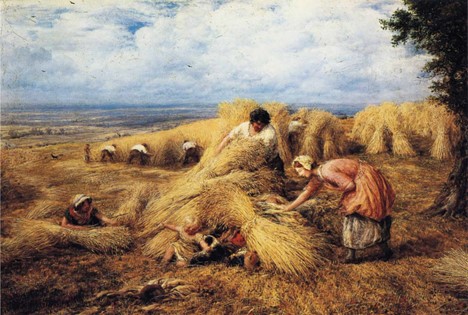
The Harvest Cradle, John Linnell, 1859.
Not a short time ago, our society was predominately agrarian (and in some parts of our neighboring areas it still is!). It was at this time of the year people looked forward to the harvest. Even today we see fall decorations with images of the harvest, such as the cornucopia. Scripture and the Church teach many things about the harvest, but as the liturgical year ends, it is good to focus on a few theological points regarding giving of first fruits and the Law of the Harvest.
Proverbs 3:9-10 teaches, “Honor the Lord with your substance and with the first fruits of all your produce; then your barns will be filled with plenty, and your vats will be bursting with wine.”[1]This exhortation to give to God is not only an expression of gratefulness to the Lord, from which every good gift flows, but it is a teaching which comes with a promise of abundant blessing for the giver. The divine promise of plenty is the law of the harvest, the premise that you can’t outgive God!
In ancient Jewish society, first fruits, whether from livestock or crops, meant giving God the first 10%, (See Leviticus 23 30-33, Deuteronomy 12:17, 14:22-29 for examples.) The word ‘tithe’ derives from an Old English word meaning a ‘tenth part’. Tithing is first mentioned in Genesis when Melchizedek offered bread and wine in thanksgiving for Abrahams’s victory over enemies and as an offering to God in thanksgiving for his victory Abraham gave Melchizedek a tenth of everything. Further in the Old Testament, God assigns tithes as recompense for the priestly tribe, the Levites, for their service in the temple. Numbers 18:21 states, “ To the Levites I have given every tithe in Israel for an inheritance, in return for their service which they serve, their service in the tent of meeting.”[2] Recall the Levites were the priestly tribe. They had no share of the land as the other eleven tribes of Jacob did. Therefore, they counted on others for their sustenance as well as for the care of the Temple.
In the New Testament, the early Church provided for their own in a similar fashion. St. Paul writes, “Do you not know that those who are employed in the temple service get their food from the temple, and those who serve at the altar share in the sacrificial offerings? 14 In the same way, the Lord commanded that those who proclaim the gospel should get their living by the gospel.”[3] (I Corinthians 9:13-14). There is no evidence, however, of legislation regarding tithing in the New Testament. We see the Lord teaching about giving from the heart (widow’s mite in Luke 21:1-4 or Mark 12:41-44 for example). St. Paul further teaches, “The point is this: he who sows sparingly will also reap sparingly, and he who sows bountifully will also reap bountifully. Each one must do as he has made up his mind, not reluctantly or under compulsion, for God loves a cheerful giver. And God is able to provide you with every blessing in abundance, so that you may always have enough of everything and may provide in abundance for every good work.”[4] (2 Corinthians 9:6-8). We see then in the New Testament God further clarifying his rules for giving, that we are to give out of love for God and neighbor, and that the Lord loves a cheerful giver. Why? Because cheerfulness is a measure of the heart, a measure of love. A cheerful giver recognizes that everything he has comes from God and out of love, wants to give back. Therefore, we could conclude that tithing is more spiritual than it is financial, a gift rather than a transaction, a way to show love for the family of God that is in a covenant relationship, rather than a requirement of contractual agreement.
The Church, in her wisdom, did enact laws to ensure growth and stability, based upon precepts found in the Old Testament. The first record of such a law was from the late 6th century. (Canons of the Council of Macon, 585.) that did require tithing. After the Protestant Reformation, and especially the French Revolution, accompanied by the growing secularization of society, the Church abandoned mandatory tithing for the faithful. Now the Church teaches, “The fifth precept of the Church, ‘You shall help to provide for the needs of the Church’ means that the faithful are obliged to assist with the material needs of the Church, each according to his own ability.”[5] The code of Canon law states, “The Christian faithful are obliged to assist with the needs of the Church so that the Church has what is necessary for divine worship, for the works of the apostolate and of charity, and for the decent support of ministers”.[6] The Church teaches giving of first fruits is part of justice, what we owe God. After the first fruits of our labor, we have a duty to provide for our family. Anything else we give after that is out of charity, out of love for God and neighbor. The Church does not mandate a “tithe” as such of any percentage of income or other resource.
Despite the fact tithing is not mandated in the Church, is it a good idea? The Law of the Harvest can help us determine an answer. The principle of sowing and reaping is part of nature, and it also applies to the spiritual life, of which tithing is a part. The Law of the Harvest dictates that you reap what you sow. But with the Divine, you can’t outgive God. What you give to God in time, talent, treasure will be multiplied and given back to you, in this world and in the next. We saw that in last week’s homily on the parable of the stewards and the talents. Not only does God bless those who give generously of their treasure, He gives them abundant blessing on what they donate in the way of time and talent to the Church as well. Perhaps the Commentator for the Ignatius Study Bible sums it up best in the note on Galatians 6:7-9.
Just as farmers invariably harvest the same crop they planted, so every thought, word, and deed sown in this life has a consequence that springs directly from it in the next. Those who sow in the Spirit will reap holiness and heavenly glory; those who sow in the flesh can expect nothing but death and decay. Since Paul speaks of a lifetime of well-doing, patience and perseverance are needed to see the fruit of our labors.[7]
This points to another aspect of the Law of the Harvest; sometimes we reap in a different season than we sow. We may not personally have the opportunity to see how our gifts of time, talent, and treasure will benefit the Church, but we should trust God in all aspects of our lives, including supporting the Church. Like the good stewards, efforts we make in this area of our lives might be enough to bring us to those glorious words, “Well done, good and faithful servant; you have been faithful over a little, I will set you over much; enter into the joy of your master”[8] (Matthew 25:23).
[1] Catholic Biblical Association (Great Britain), The Holy Bible: Revised Standard Version, Catholic Edition (New York: National Council of Churches of Christ in the USA, 1994), Pr 3:9–10.
[2] Ibid., Nu 18:21.
[3] Ibid., 1 Co 9:13–14.
[4] Ibid., 2 Co 9:6–8.
[5] Catholic Church, Catechism of the Catholic Church, 2nd Ed. (Vatican City: Libreria Editrice Vaticana, 1997), 494.
[6] Code of Canon Law: New English Translation (Washington, DC: Canon Law Society of America, 1998), 65.
[7] The Ignatius Catholic Study Bible: The New Testament (San Francisco: Ignatius Press, 2010), 341.
[8] The Holy Bible, Revised Standard Version; Second Catholic Edition. (San Francisco: Ignatius Press, 2006), Mt 25:23.





Leave A Comment